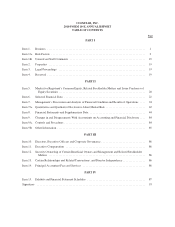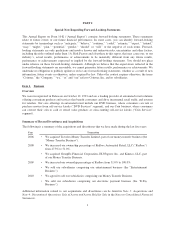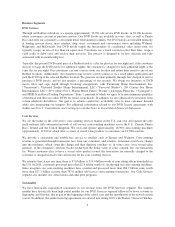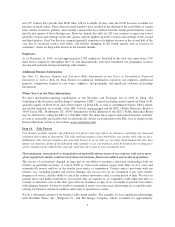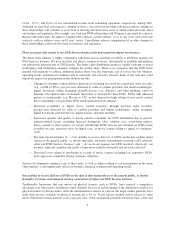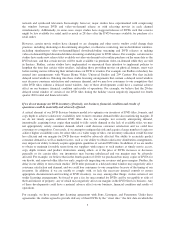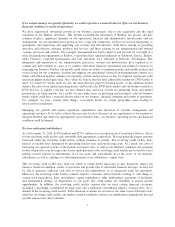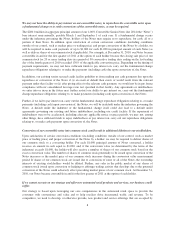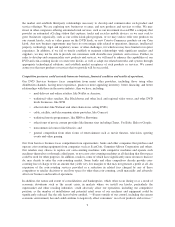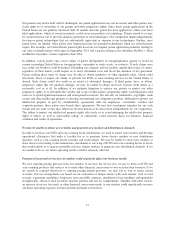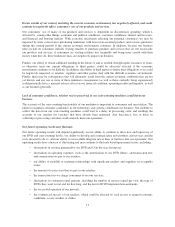Redbox 2010 Annual Report Download - page 18
Download and view the complete annual report
Please find page 18 of the 2010 Redbox annual report below. You can navigate through the pages in the report by either clicking on the pages listed below, or by using the keyword search tool below to find specific information within the annual report.Our business can be adversely affected by severe weather, natural disasters and other events beyond our
control, such as earthquakes, fires, power failures, telecommunication loss and terrorist attacks.
A catastrophic event that results in the destruction or disruption of any of our critical business or information
technology systems could harm our ability to conduct normal business operations and our operating results. For
example, our corporate headquarters and certain critical business operations are located in the Bellevue,
Washington area, which is near major earthquake faults. While we have taken steps to protect the security of
critical business processes and systems and have established certain back-up systems and disaster recovery
procedures, any disruptions, whether due to inadequate back-up or disaster recovery planning, failures of
information technology systems, interruptions in the communications network, or other factors, could seriously
harm our business, financial condition and results of operations.
In addition, our operational and financial performance is a direct reflection of consumer use of and the ability to
operate and service the DVD and coin-counting kiosks used in our business. Severe weather, natural disasters
and other events beyond our control can, for extended periods of time, significantly reduce consumer use of our
products and services as well as interrupt the ability of our employees and third-party providers to operate and
service our equipment and machines. In some cases, severe weather, natural disasters and other events beyond
our control may result in extensive damage to, or destruction of, our infrastructure and equipment, including loss
of machines used to provide our products and services, which losses may not be fully covered by insurance.
Defects, failures or security breaches in and inadequate upgrades of, or changes to, our operating systems
could harm our business.
The operation of our DVD and Coin Services businesses depends on sophisticated software, hardware, computer
networking and communication services that may contain undetected errors or may be subject to failures or
complications. These errors, failures or complications may arise particularly when new, changed or enhanced
products or services are added. In the past, there have been limited delays and disruptions resulting from
upgrading or improving these operating systems. Future upgrades, improvements or changes that may be
necessary to expand and maintain our business could result in delays or disruptions or may not be timely or
appropriately made, any of which could seriously harm our operations.
Further, certain aspects of the operating systems relating to our business are outsourced to third-party providers,
including long-distance telecommunications. Accordingly, the effectiveness of these operating systems is, to a
certain degree, dependent on the actions and decisions of third-party providers over whom we may have limited
control.
Failure to adequately comply with information security policies or to safeguard against breaches of such
policies could adversely affect our operations and could damage our business, reputation, financial position
and results of operations.
As our business expands to provide new products and services, we are increasing the amount of consumer data
that we collect, transfer and retain as part of our business. These activities are subject to laws and regulations, as
well as industry standards, in the United States and other jurisdictions in which our products and services are
available. These requirements, which often differ materially and sometimes conflict among the many
jurisdictions in which we operate, are designed to protect the privacy of consumers’ personal information and to
prevent that information from being inappropriately used or disclosed. We maintain and review technical and
operational safeguards designed to protect this information and generally require third party vendors and others
with whom we work to do so as well. However, despite those safeguards, it is possible that hackers, employees
acting contrary to our policies, third-party agents or others could improperly access relevant systems or
improperly obtain or disclose data about our consumers, or that we may be determined not to be in compliance
with applicable legal requirements and industry standards for data security, such as the Payment Card Industry
guidelines. Any breach of relevant security policies that compromises consumer data or determination of
non-compliance with applicable legal requirements or industry standards for data security could expose us to
10


